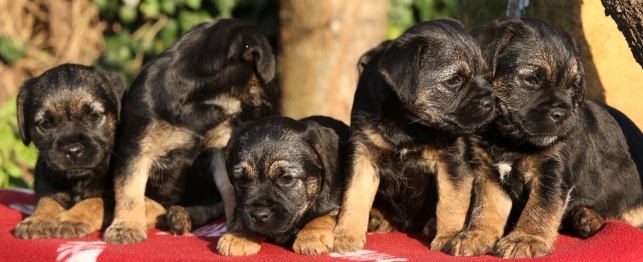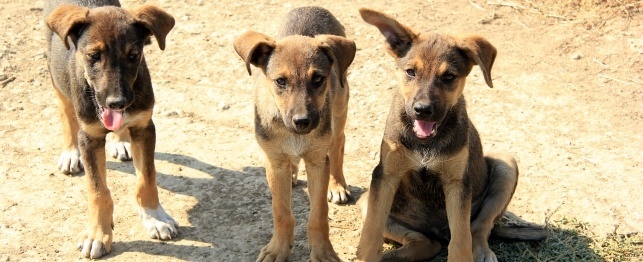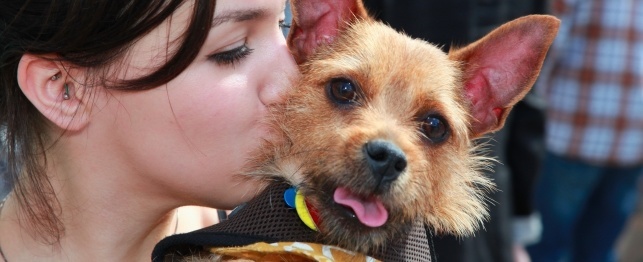
Dogs
The border collie crouched in the snow, alert, tense, eyes darting back and forth between the sheep and the man standing a few yards from her. Anxiously, she awaited his command.
"Away to me," Roger Culbreath said firmly, uttering an ancient phrase used by Scottish shepherds to their dogs for centuries. The border collie was off like a shot, running counterclockwise around the sheep some 50 yards away.
The sheep turned and went in the desired direction. Culbreath smiled. "That'll do," he shouted. And at once, the dog stopped in her tracks, then returned to Culbreath's side.
Culbreath tooted on his whistle, and farther out in the field, another dog took over the herding of the sheep, responding to Culbreath's whistled commands.
These fields, 75 miles northeast of Denver on the Colorado plains, are Culbreath's classroom; the border collies his students; and the sheep his teaching assistants. Culbreath trains dogs to herd sheep.
Many of his students – mostly border collies, but a few Australian shepherds and a smattering of other breeds – go on to win prizes at sheep-herding trials and attain great competitive fame. But most of them, competitors or not, are working dogs, earning a living on sheep ranches throughout the west.
In an era of high technology and mechanized farming, no one has come up with a better way to tend sheep than a well-trained dog.
One hundred and fifteen dogs – including some of the country's leading sheep-herding dogs – will be in the Stock Dog Trials, part of the annual National Western Stock Show. The dogs will be asked to herd three sheep in a "figure 8" pattern around two barrels, then bring them from one end of the arena to the other, through a chute, then into a pen, all while the handler remains in a fixed spot. Handlers direct their dogs through whistles or voice commands.
The Stock Show and Rodeo has been a Denver mainstay for 94 years, drawing more than 600,000 visitors over two weeks. Since being added to the show in 1995, the stock dog trials repeatedly have played to standing-room-only crowds. The movie Babe, about a sheep-herding pig, only added to the event's luster, says Culbreath, who is the superintendent of the National Western stock dog trials, as well as a competitor.
"People are fascinated by stock dogs," says Culbreath, who also breeds border collies. "One man with one dog can go out and do the work of five men on horseback."
Yet border collies and other dogs bred to work with livestock don't always make the best pets – particularly for city dwellers. "They're not compelled, but obsessed to work," Culbreath says. "If you don't have a job for them, they'll drive you crazy, herding children and chasing cars."
Originating in the British Isles some 400 years ago, border collies are unequaled at dominating livestock. They do it with an intense stare that defies a lesser species to question their authority. "With other breeds, power and authority come through biting the livestock," Culbreath says. "And that's bad. The public won't tolerate a dog who bites sheep."
Culbreath says it's often hard to tell in advance which dogs will do well as stock dogs, and which are more likely destined for a life of pet-hood. Beyond that, a dog that's excellent at herding sheep on the open range may fare poorly in the confined area used in competition.
"A good solid dog, one adaptable for use on the ranch and in competition, must have character, he needs to have natural balance, he must have power or authority over livestock ... and an extreme desire to please his owner," he says. "Those are all natural characteristics of border collies. But it's rare to find that right mixture of those things in one dog. I've had two or three that fit that bill. People may go a lifetime without finding just that right dog."
Culbreath had to say goodbye to one of those rare dogs last summer. Fifteen-year-old Trim was put down in July. She retired from active herding in 1995 after spending most of her adult life ranked as one of the top 20 sheep-herding dogs in the country. Her last competition was at the 1995 National Western where it was Culbreath's error that cost her the championship, he concedes. She came in second.
Culbreath has another dog entered in the competition this year, five-year-old Lad, but he's not optimistic about the dog's chances.
"We're new to each other, Lad and me, and we're just getting to know one another," Culbreath says. Lad came from Scotland, where he was herding sheep in vast pastures. "He's used to working in great big fields," Culbreath says. "I expect the confines of a small arena will throw him a bit of a curve."
 Choosing a Pet for College
Choosing a Pet for College
Choosing a Pet for College
Choosing a Pet for College
 10 Best Dog Breeds for Millennials
10 Best Dog Breeds for Millennials
10 Best Dog Breeds for Millennials
10 Best Dog Breeds for Millennials
 What to Look For in an Ethical Dog Breeder
What to Look For in an Ethical Dog Breeder
What to Look For in an Ethical Dog Breeder
What to Look For in an Ethical Dog Breeder
 Dog Hoarding: The Hidden Suffering
Dog Hoarding: The Hidden Suffering
Dog Hoarding: The Hidden Suffering
Dog Hoarding: The Hidden Suffering
 Tips to Find Your Perfect Match: The Best Rescue Dog
Tips to Find Your Perfect Match: The Best Res
Tips to Find Your Perfect Match: The Best Rescue Dog
Tips to Find Your Perfect Match: The Best Res
Copyright © 2005-2016 Pet Information All Rights Reserved
Contact us: www162date@outlook.com